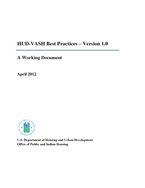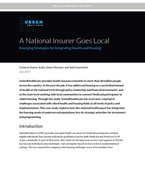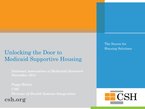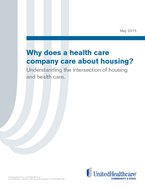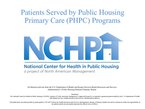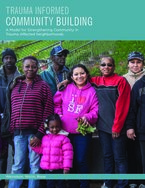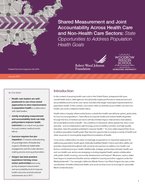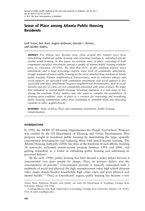Found 1040 resources.
0
0
0
The study finds three out of five adults across the U.S. had at least one adverse experience in their childhood, such as divorce, a parent's death, physical or emotional abuse, or a family member's incarceration or substance abuse problem. A quarter of adults have at least three such experiences in childhood, which – according to other research — increases their risk for most common chronic diseases, from heart disease and cancer to depression and substance abuse.
Topics: Child welfare, Depression, Early childhood, Low-income, Mental health, Racial inequalities, Research
0
0
0
The King County Housing Authority (KCHA), in partnership with the Highline School District and the nonprofit social service organization Neighborhood House, launched the Student and Family Stability Initiative (SFSI) pilot program in 2013 to provide housing and employment supports to homeless and unstably housed families with children enrolled in Highline elementary schools. In 2016, KCHA contracted with the Urban Institute (Urban) to conduct a process and outcome evaluation of the program’s first three pilot years. This evaluation documents how SFSI works, who it serves, and how well it...
Topics: Attendance, Dual-generation, Education, Family engagement, Housing, Low-income, Pacific Northwest, Partnerships, Place-based, Research, Stability, Workforce development, Youth
0
0
0
Understanding the characteristics of infants and toddlers in our states and communities is an important first step for supporting children’s development during their most critical years. Making more detailed and comprehensive information available on the young children living in different communities can help stakeholders more strategically develop and target key services such as child care, home visiting, or other services for young children. For example, knowing how many young children live in low-income families and what share have parents working full time can help states and localities...
Topics: Early childhood, East Coast, Health, Legislation & Policy, Midwest, South, West Coast
0
0
0
Maternal depression is a widespread public health concern that has been linked to negative impacts on child development and health outcomes. Within home visiting programs serving low-income women, maternal depression rates have been measured as high as 61 percent. Home visitors are uniquely positioned to help address maternal depression and can play an important role in conducting screenings and providing referrals to community resources. This brief summarizes the existing research to illustrate the importance of addressing maternal depression in home visiting programs, and outlines three...
Topics: Early childhood, Health, Homelessness, Low-income, Mental health
0
0
0
Evidence shows that investing in children today can decrease poverty for the next generation of adults. Host Justin Milner speaks with researchers Heather Hahn and Cary Lou about the federal government’s current spending on kids, future projections for this spending, and what that means for America’s children.
Topics: Child welfare, Early childhood, Education, Funding, Legislation & Policy, Research, Youth
0
0
0
About MDRC’s “Evidence First” Podcast Series:
Policymakers talk about solutions, but which ones really work? Join Katie Beal, MDRC’s External Affairs Associate, as she talks with experts about the best evidence available on education and social programs that serve low-income people.
Topics: Education, Funding, Legislation & Policy, Low-income, Post-secondary, Workforce development, Youth
0
1
1

A body of evidence points to a link between living in areas of concentrated poverty and health.
Topics: Child welfare, Community development, Health, Housing, Low-income, Medicaid / Medicare, Metrics, Partnerships, Racial inequalities, Safety
 Shared by Housing Is
on Aug 20, 2018
Shared by Housing Is
on Aug 20, 2018 0
1
1

Our initial report—which followed participants around the country over three years—found, among other things, that Year Up increased participants’ average quarterly earnings by more than 50 percent. These are the largest gains in earnings measured to date in random assignment studies of workforce training programs for youth and adults.
Topics: Asset building, Education, Low-income, Mobility, Post-secondary, Research, Workforce development, Youth
 Shared by Housing Is
on Aug 16, 2018
Shared by Housing Is
on Aug 16, 2018 0
0
0
Partnerships between medicaid and supportive housing providers
Topics: Cost effectiveness, Funding, Health, Legislation & Policy, Low-income, Medicaid / Medicare, Partnerships, Supportive housing
 Shared by Housing Is
on Aug 9, 2018
Shared by Housing Is
on Aug 9, 2018 0
0
0
Systems for Action (S4A) is a national program of the Robert Wood Johnson Foundation (RWJF) that aims to discover and apply new evidence about ways of aligning the delivery and financing systems for medical, social, and public health services that support a Culture of Health. This program, as well as RWJF’s other three signature research programs, Evidence for Action, Policies for Action, and Health Data for Action (launching April 19, 2017), are investigating the impact of different types of programs, policies, and health-related systems on health, equity and well-being.
Topics: Funding, Health, Housing, Partnerships, Research
 Shared by Housing Is
on Aug 9, 2018
Shared by Housing Is
on Aug 9, 2018 0
0
0
In the fall of 2011, a request for the submission of best practices was sent to public housing agencies (PHAs) and VA Medical Centers (VAMCs) that administer the program via the HUDVASH listserv. Over 50 best practices accounts were submitted in response to the request. The practices below have been compiled based on these accounts, which were cross-referenced with monthly data on agency performance and further developed through phone interviews.
Topics: Health, Housing, Partnerships
 Shared by Housing Is
on Aug 9, 2018
Shared by Housing Is
on Aug 9, 2018 0
0
0
UnitedHealthcare provides health insurance benefits to more than 40 million people across the country. In the past decade, it has addressed housing as a social determinant of health at the national level through policy leadership and financial investments, and at the state level working with local communities to connect Medicaid participants to stable housing. Through this work, UnitedHealthcare has overcome a myriad of challenges associated with siloed health and housing fields at all levels of policy and implementation. This case study explores how this national health payer has integrated...
Topics: Affordable Care Act, Data sharing, Funding, Health, Homelessness, Housing, Low-income, Medicaid / Medicare, Partnerships
 Shared by Housing Is
on Aug 9, 2018
Shared by Housing Is
on Aug 9, 2018 0
0
0
Introduction to supportive housing and notes from the field
Topics: Health, Housing, Low-income, Medicaid / Medicare, Mental health, Partnerships, Supportive housing
 Shared by Housing Is
on Aug 9, 2018
Shared by Housing Is
on Aug 9, 2018 0
0
0
In a post health care reform era, Medicaid programs need to build system capacity to effectively manage increasingly complex Medicaid populations while simultaneously seeking innovative solutions to reduce costs and improve access. As states are increasingly becoming more reliant upon managed care for complex populations – such as individuals in need of long-term services and supports, those with intellectual or developmental disabilities, individuals with severe and persistent mental illness, as well as children with special health care needs – the needs of these populations range far beyond...
Topics: Funding, Health, Housing, Low-income, Medicaid / Medicare, Partnerships
 Shared by Housing Is
on Aug 9, 2018
Shared by Housing Is
on Aug 9, 2018 0
0
0
Information on PHPC Programs
Topics: Health, Housing, Mental health, Partnerships
 Shared by Housing Is
on Aug 9, 2018
Shared by Housing Is
on Aug 9, 2018 0
0
0
Trauma is a set of normal human responses to stressful and threatening experiences (National Center for PTSD, 2007). Low-income and public housing residents may experience cumulative trauma resulting from daily stressors of violence and concentrated poverty, as well as historic and structural conditions of racism and disenfranchisement. We present a model of Trauma Informed Community Building (TICB) that addresses the challenges trauma poses to traditional community building strategies. TICB strategies de-escalate chaos and stress, build social cohesion and foster community resiliency over...
Topics: Community development, Housing, Low-income, Mental health, Racial inequalities
 Shared by Housing Is
on Aug 9, 2018
Shared by Housing Is
on Aug 9, 2018 0
0
0
The Colorado Coalition for the Homeless created the Denver Housing First Collaborative (DHFC) in 2003 with funding provided by a collaboration of federal agencies. The DHFC involved CCH as the lead agency, Denver Department of Human Services (DDHS), Denver Health (DHHA), Arapahoe House, the Mental Health Center of Denver (MHCD) and the Denver VA Medical Center. The DHFC is designed to provide comprehensive housing and supportive services to chronically homeless individuals with disabilities. Initial federal funding created the capacity to house and serve 100 chronically homeless individuals...
Topics: Cost effectiveness, Funding, Health, Homelessness, Housing, Pacific Northwest, Partnerships, Research, Stability, Supportive housing
 Shared by Housing Is
on Aug 9, 2018
Shared by Housing Is
on Aug 9, 2018 0
0
0
Everyone needs safe, decent, stable housing. For some of the most vulnerable people in America — people with mental illness, chronic health conditions, histories of trauma, and other struggles — a home helps them to get adequate treatment and start on the path toward recovery. But some conditions make it difficult for people to maintain a stable home without additional help. Supportive housing, a highly effective strategy that combines affordable housing with intensive coordinated services, can provide that needed assistance.
Topics: Cost effectiveness, Disabilities, Health, Homelessness, Housing, Low-income, Medicaid / Medicare, Mental health, Place-based, Seniors, Supportive housing
 Shared by Housing Is
on Aug 9, 2018
Shared by Housing Is
on Aug 9, 2018 0
0
0
The Vita Health & Wellness District is a one-mile corridor in Stamford, Connecticut, that has positioned itself as a “health-themed neighborhood,” offering mixed-income housing, health care services, community farming, early childhood education programming, and supportive services to residents. Led by the city’s public housing authority Charter Oak Communities and Stamford Hospital, this collaboration of city agencies and community-based organizations has focused on building physical and social capacity in a distressed neighborhood, with an emphasis on leveraging collective investments to...
Topics: Community development, Education, Food insecurity, Funding, Health, Housing, Nutrition, Partnerships
 Shared by Housing Is
on Aug 9, 2018
Shared by Housing Is
on Aug 9, 2018 0
0
0
Annuities, long-term care insurance (LTCI), and reverse mortgages appear to offer important consumption smoothing benefits to the elderly, yet private markets for these products are small. A prominent idea is to combine LTCI and annuities to alleviate both supply (selection) and demand (liquidity) problems in these markets. This paper shows that if consumers typically liquidate home equity only in the event of illness, then LTCI and annuities become substitutes and less attractive. Simulations confirm that without home equity loans, both LTCI and constant real annuities may be welfare...
Topics: Asset building, Health, Housing, Medicaid / Medicare, Seniors
 Shared by Housing Is
on Aug 9, 2018
Shared by Housing Is
on Aug 9, 2018 0
0
0
Social determinants of health are the economic and social conditions that affect health outcomes and are the underlying, contributing factors of health inequities. Examples include housing, educational attainment, employment and the environment.
Topics: Affordable Care Act, Disabilities, Health, Homelessness, Housing, Low-income, Medicaid / Medicare, Mental health, Partnerships, Place-based, Substance abuse, Supportive housing
 Shared by Housing Is
on Aug 9, 2018
Shared by Housing Is
on Aug 9, 2018 0
0
0
This brief outlines how state agencies can employ shared measurement and joint accountability across sectors as tools for improving population health outcomes. States can use these tools to drive coordination of preventive efforts and broaden the boundaries of population health achievements that no sector, or isolated incentive, can achieve alone.
Topics: Child welfare, Data sharing, Education, Family engagement, Health, Housing, Low-income, Metrics
 Shared by Housing Is
on Aug 9, 2018
Shared by Housing Is
on Aug 9, 2018 0
0
0
For almost two decades now, cities around the country have been demolishing traditional public housing and relocating residents to subsidized private market rental housing. In this paper, we examine sense of place, consisting of both community and place attachment, among a sample of Atlanta public housing residents prior to relocation.
Topics: Asset building, Housing, Legislation & Policy, Low-income, Mental health, Mobility, Research, South, Stability
 Shared by Housing Is
on Aug 9, 2018
Shared by Housing Is
on Aug 9, 2018 0
0
0
Mental health assessment
Topics: Health, Mental health
 Shared by Housing Is
on Aug 9, 2018
Shared by Housing Is
on Aug 9, 2018 


